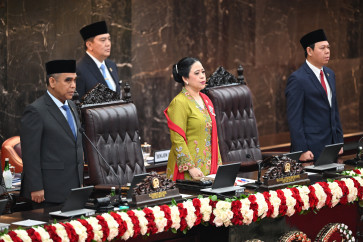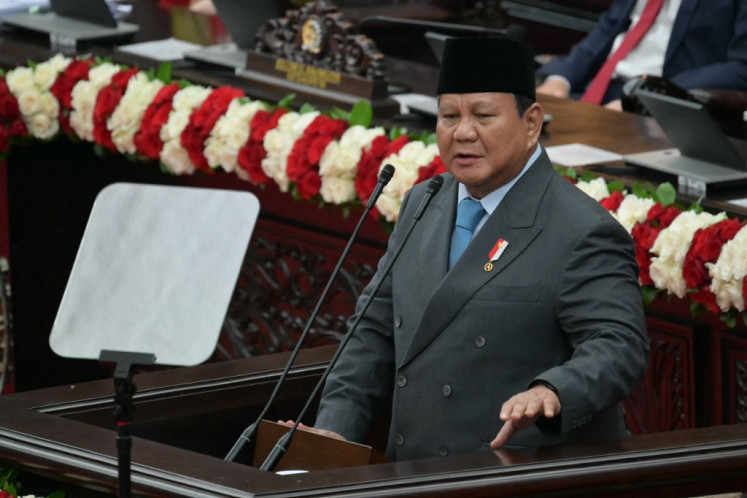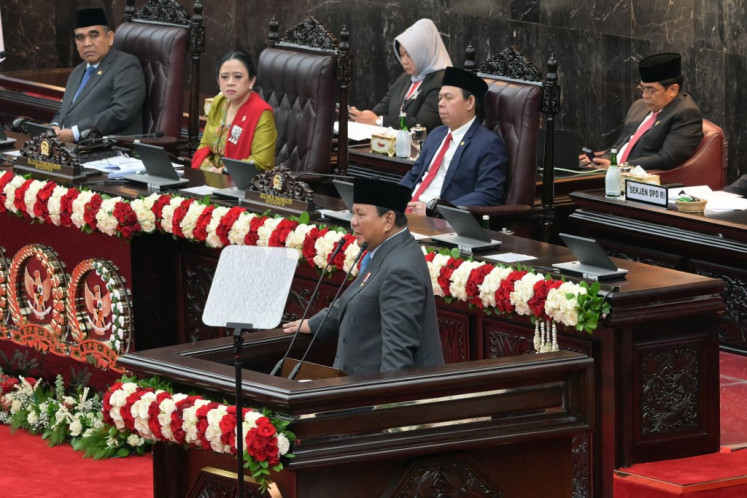Popular Reads
Top Results
Can't find what you're looking for?
View all search resultsPopular Reads
Top Results
Can't find what you're looking for?
View all search resultsBI shifts to longer term notes to curb outflow of foreign funds
Bank Indonesia (BI) has temporarily stopped the sale of its SBI promissory notes with a maturity of less than nine months in order to help shift short-term investments to longer-term debt instruments, a move that analysts say could help cope with the possibility of a sudden reversal of foreign funds
Change text size
Gift Premium Articles
to Anyone
B
ank Indonesia (BI) has temporarily stopped the sale of its SBI promissory notes with a maturity of less than nine months in order to help shift short-term investments to longer-term debt instruments, a move that analysts say could help cope with the possibility of a sudden reversal of foreign funds.
BI spokesman Difi A. Johansyah said on Wednesday that, as of February, the central bank would focus on the issuance of Bank Indonesia short-term promissory notes (SBI notes) with nine-month maturities.
In addition to the issuance of the nine-month SBI notes, the central bank also used a six-month deposit in absorbing excess liquidity in the banking system, he said.
“In line with the grand design to strengthen monetary management and financial market development, Bank Indonesia will continue to use an open market operation in absorbing the excess liquidity such as through the issuances of SBI and term deposits with longer-than-usual tenures,” Difi said in a statement sent to reporters on Wednesday.
SBI notes are short-term debt papers issued by the country’s central bank which could be sold to both domestic and foreign investors and are tradable in the secondary market. Meanwhile, term deposits could only be bought by local banks and are non-tradable and should be held to maturity.
“Foreign investors could not purchase term deposits, so they would have to buy long-term SBIs,” Difi told The Jakarta Post. He added that the term deposits were also used to replace SBI notes with a maturity of less than nine months.
He said the central bank’s policy to focus on the issuance of longer-term SBI notes and non-tradable term deposits was needed to ensure that foreign short-term portfolio investments stay longer.
The low interest rate policy adopted by developed countries has resulted in the influx of funds to emerging markets such as Indonesia which offered high interest rates. BI’s decision last week to increase the benchmark rate to 6.75 percent from record low of 6.5 percent could further lure foreign funds into the country’s debt markets.
Analysts have warned that the sharp increase in the short-term investment in the country might endanger the country’s economy because their sudden reversal in a time of crisis could cause financial shock, such as in the 1997 and 2008 financial crises.
Eric Sugandi, an analyst at the Standard Chartered Bank, said the central bank’s move would, in the short-term, ease the volatility of the rupiah as the shifting of funds to longer-term debt instruments would result in the strengthening of the rupiah against the US dollar.
“I see the move as an attempt to shift foreign hot money to places where it could not affect currency volatility too much,” he told the Post in a telephone interview.
The recent sell-offs in the nation’s stock and debt markets throughout January have weakened the rupiah after it appreciated by 4.4 percent in 2010. The rupiah depreciated by 0.9 percent in the first month of the year, but gained 1.57 percent recently after the central bank raised its benchmark interest rate, attracting foreign inflows back to the country.
BI officials said the central bank would let the currency appreciate this year to help ease inflation from imported prices.
Eric added that the BI move also signaled the bank “wanted to bring back SBIs’ role as a monetary policy instrument, not for investment”. The markets’ reaction, according to Eric, would vary from following the central bank’s maturity extension to shifting their funds to government bonds. “The side effect is that [investors] would help the government in growing the government bond.










